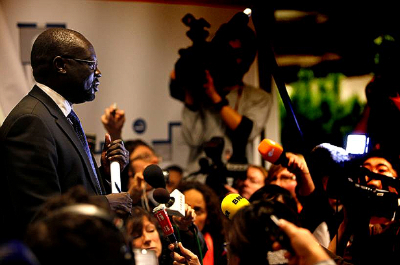COPENHAGEN–What a day here in Copenhagen. For much of the afternoon and well into the evening, the cold and dark seemed to settle more deeply today on this city of 1.2 million. Here in the Bella Center, as the day turned to night without an agreement to cool the planet that most people expected today, the meditation and prayer rooms were noticeably more busy. After months of work this year, and 12 days of negotiation at the U.N. Climate Change Conference, it looked for much of the day as if 120 heads of state might actually leave Denmark without any agreement at all. Certainly there are fossil-fuel industry board rooms in Houston where such an outcome would be celebrated.
 Lumumba Di-Aping tells the media that the climate deal announced late Friday by Barack Obama and other world leaders is unacceptable to the G77 nations.J. Carl Ganter/Circle of BlueBut less than two hours before midnight word circulated through Bella that agreement had been struck, though the significance of the various measures is not, at this writing, crystal clear. The final text, negotiated by the United States, Brazil, China, India, and South Africa, has not been completed, though negotiators were assigned by heads of state to complete that task tonight.
Lumumba Di-Aping tells the media that the climate deal announced late Friday by Barack Obama and other world leaders is unacceptable to the G77 nations.J. Carl Ganter/Circle of BlueBut less than two hours before midnight word circulated through Bella that agreement had been struck, though the significance of the various measures is not, at this writing, crystal clear. The final text, negotiated by the United States, Brazil, China, India, and South Africa, has not been completed, though negotiators were assigned by heads of state to complete that task tonight.
NGO climate experts also cautioned that the agreement has not been made final, and that many other countries have not signed off on its provisions. The European Union, which scheduled a news conference before midnight, abruptly cancelled the event tonight. And just after midnight Lumumba Di-Aping, the Sudanese chair of the G77, the international alliance of developing nations, held a news conference and lashed the deal.
Di-Aping said the agreement would hurt developing nations and “lock people of the developing world in poverty.” He said the financial terms, $10 billion annually provided by developed nations to developing nations each year through 2012, “was nothing compared to the risks.” And he accused the United States, with the assistance of Denmark, of essentially strong arming poor nations into accepting the measure. Di-Aping indicated that “if one country doesn’t agree to this agreement, then there is no deal.”
According to American NGO experts and President Obama, who held a news conference at 10:30, the deal reached by the United States and the three other nations aims at 1) limiting carbon emissions so that global temperatures do not exceed 2 degrees Celsius, 2) committing nations to concrete emissions targets, and 3) subject participating countries to international analysis of their commitments. In its essence, the agreement’s structure is consistent with what President Obama outlined to heads of state and delegates early this afternoon.
It also is the first agreement to provide diplomatic space for the United States and China to work together to tackle global climate change.
Other measures included in the agreement, which its authors called the “Copenhagen Accord,” are:
1. Establishing a global climate action fund that would take in and invest $100 billion annually by 2020 for climate action, clean energy investment, and helping poor nations adapt to climate change.
2. Establishing a high-level panel within the United Nations to oversee the financial provisions of the agreement.
3. Calling for an assessment of the effectiveness of the Copenhagen Accord to be completed by 2015.
The deal is not legally binding, though the president said it was a “first step” toward developing a much stronger binding agreement. He did not say when that might occur, and wasn’t clear tonight whether negotiating a legally binding treaty was possible within a year. “I am supportive of such efforts,” he said. “This is a classic example of how if we just waited for that then we would not make any progress.”
Representatives of international climate advocacy organizations were critical of the deal, asserting that it was not nearly strong enough. Ricken Patel, executive director of Avaaz.org, greeted the deal this way:
“The so-called Copenhagen Accord is an historic failure, representing the collapse of international efforts to sign a binding global treaty that can stop catastrophic climate change. Perhaps most telling, while leaders themselves recognize that this agreement is insufficient, they have set no deadline or even date to complete it.”
American environmental leaders were more supportive, asserting the agreement was a step that strengthened American and global action to limit carbon emissions and accelerate the vast economic transition built on a new foundation of clean energy development.
“The world’s nations have come together and concluded a historic-if incomplete-agreement to begin tackling global warming,” said Carl Pope, executive director of the Sierra Club. “Tonight’s announcement is but a first step and much work remains to be done in the days and months ahead in order to seal a final international climate deal that is fair, binding, and ambitious. It is imperative that negotiations resume as soon as possible.”
“Today’s agreement takes the first important steps toward true transparency and accountability in an international climate agreement,” said Fred Krupp, president of the Environmental Defense Fund. “The sooner the U.S. speaks through Senate legislation, the sooner we can set the terms of engagement for talks to come.”
President Obama avoided being specific about a timetable for making the agreement more robust and binding. “We strive for more binding agreements over time,” said the president.
“This is going to be hard,” added the president, who indicated he would leave Copenhagen immediately. “It’s going to be hard within countries and it’s going to be hard between countries.”
Later tonight, a State Department official told NGO leaders that the European Union had signed off on the accord. The G-77 nations are in consultation. And the entire text of the agreement will be reviewed and debated in a plenary session tonight.
Yvo de Boer, head of the UN climate change secretariat, issued a statement that was cautionary about the agreement’s potential to be accepted by tonight’s plenary. “The mountain goes on and on, it seems. I do think we need to see how this text is received by the broader group of countries. It’s great that small group of leaders gets together and tries to advance the process. But ultimately the way things work here it has to be acceptable to every country.
“If this makes it through the meeting in a couple of hours’ time then I see it as a modest success. We could have achieved more.”
Spread the news on what the føck is going on in Copenhagen with friends via email, Facebook, Twitter, or smoke signals.



